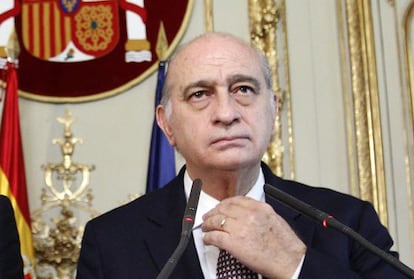Judges, lawyers and police argue that Citizens Safety Law will curtail rights
Government is seeking to protect itself with "unnecessary legislation"

"Unnecessary" is how judge, attorney and police associations, as well as academics, are unanimously describing the proposed Citizens Safety Law.
Critics say the center-right government of the Popular Party (PP) is looking to protect itself from growing social protests on the streets. The bill is expected to pass in Congress early next year, and includes fines of up to 30,000 euros for such actions as leaving "fierce or harmful" dogs loose, ignoring a police officer's instructions or "offenses against Spain," such as shouting or carrying signs "that are harmful or abusive to Spain or any region" during a demonstration.
Spain has one of the lowest crime rates in Europe. Of the more than 4,000 street demonstrations held in Madrid last year, there were just 10 instances of disorderly conduct, according to police sources.
Interior minister sees poll rating plummet
Interior Minister Jorge Fernández Díaz has the dubious honor of having become a serious challenger to Education Minister José Ignacio Wert as the most controversial member of the Spanish Cabinet, according to a Metroscopia poll for EL PAÍS.
The interior minister gets the sixth worst grade of all cabinet members, and loses support not just from the opposition parties, but even from voters from his own Popular Party.
Fernández's new Citizens Safety Law, which envisions fines of up to 30,000 euros for misdemeanors such as bearing signs with "offenses against Spain," has galvanized opposition against him. This comes on top of his handling of the end of the "Parot Doctrine," which has resulted in the release of terrorists and serial rapists from prison following a decision by the European Court of Human Rights.
Public security ranked 10th on the list of Spaniards' main concerns in an October survey by the Center for Sociology Studies (CIS), far behind unemployment, political wrongdoing, spending cuts and corruption.
The public security bill establishes administrative sanctions for infractions that, until now, fell under the category of misdemeanors in the Penal Code. Under the new system, fines will be much heftier and levied without the legal guarantee of a trial. Financial punishment may be as high as 600,000 euros, and confiscation of assets is contemplated when violators refuse to pay. A court appeal is possible, but requires paying the new legal fees on top of the fine, which must now be paid before the trial, not afterward.
"It would seem that the government does not trust the judges," says Joaquim Bosch, spokesman for the Judges for Democracy association. "It wants to assume the ability of sanctioning forms of conduct in an extremely discretionary manner, using vague legal concepts, which can lead to very authoritarian action."
Two other judge associations, Francisco de Vitoria and Foro Judicial, agreed with this view.
"We are a peaceful society, there is no social revolt, and yet in a display of inexplicable fear the government thinks it necessary," says Álvaro García of the Progressive Union of Attorneys. "[The bill] is more dangerous than people might think, and a brutal weapon for immediate action."
"This is going to create more tension because it will mean cutting back on rights," adds José María Benito, spokesman for the Unified Police Union (SUP).
José Luis Díez Ripollés, a professor of penal law at Málaga University, says the law "extends sanctioning rights to unheard-of levels."
"It's pure reactionary, conservative nonsense to criminalize street protests and criticism," adds Joan Queralt, a professor of penal law in Barcelona.
Víctor Sampedro, who teaches communication at Rey Juan Carlos University, also believes the law aims to "contain the voices in the street" during a political term that will see three back-to-back elections. The PP will want to "sell people the victory of leaving the crisis behind and the false measures for democratic regeneration." But Sampedro warns this kind of self-protection is only possible through "a repression that extends beyond the frontiers of the rule of law, which will have a boomerang effect, lighting the spark on the streets."
Tu suscripción se está usando en otro dispositivo
¿Quieres añadir otro usuario a tu suscripción?
Si continúas leyendo en este dispositivo, no se podrá leer en el otro.
FlechaTu suscripción se está usando en otro dispositivo y solo puedes acceder a EL PAÍS desde un dispositivo a la vez.
Si quieres compartir tu cuenta, cambia tu suscripción a la modalidad Premium, así podrás añadir otro usuario. Cada uno accederá con su propia cuenta de email, lo que os permitirá personalizar vuestra experiencia en EL PAÍS.
¿Tienes una suscripción de empresa? Accede aquí para contratar más cuentas.
En el caso de no saber quién está usando tu cuenta, te recomendamos cambiar tu contraseña aquí.
Si decides continuar compartiendo tu cuenta, este mensaje se mostrará en tu dispositivo y en el de la otra persona que está usando tu cuenta de forma indefinida, afectando a tu experiencia de lectura. Puedes consultar aquí los términos y condiciones de la suscripción digital.








































